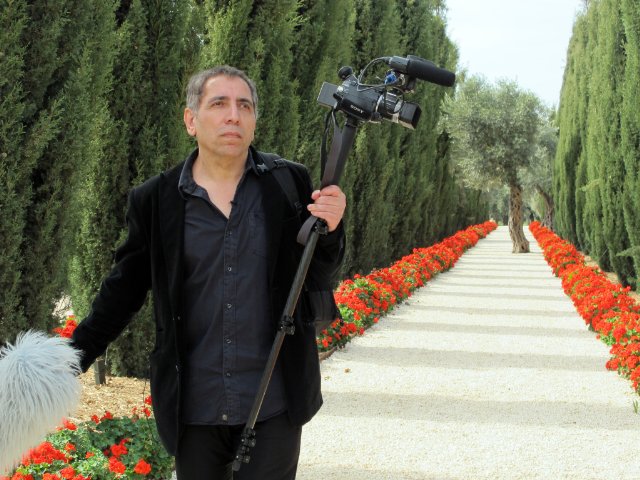By Armond White
The secular tendency that dominates today’s movies makes the spiritual inquiry in The Gardener (showing at The Quad) even more remarkable. It is the bold new film by one of the great international moviemakers, Iran’s Mohsen Makhmalbaf, who typically, transcends genre; here mixing the religious feeling of Biblical epics like Frank Borzage’s The Big Fisherman into a rigorous documentary about the appeal of the Baha’i sect.
 Makhmalbaf’s semi-historical tale fronts a very modern proposal: “Why not use the power of religion to promote peace?” he asks his adult son, Maysam, who appears with him on screen as they both–cameras in hand–track down contemporary religious devotion. Pere et fils contradict the mainstream media’s post-9/11 skepticism that blames religion as the cause of war. Makhmalbaf, once an Iranian radical imprisoned for his 1989 film The Peddler, here states “I am an agnostic filmmaker.” Yet, attempting impartiality, he cites the ironic contemporary distrust of Christianity and caution about Islam, then through interviews, historical clips and assorted pageants, grants the beatific evidence of Baha’i believers: “The Bahai faith is Hope actualized” says a devotee and Makhmalbaf presents people standing in tree poses. Awe takes the place of proselytizing.
Makhmalbaf’s semi-historical tale fronts a very modern proposal: “Why not use the power of religion to promote peace?” he asks his adult son, Maysam, who appears with him on screen as they both–cameras in hand–track down contemporary religious devotion. Pere et fils contradict the mainstream media’s post-9/11 skepticism that blames religion as the cause of war. Makhmalbaf, once an Iranian radical imprisoned for his 1989 film The Peddler, here states “I am an agnostic filmmaker.” Yet, attempting impartiality, he cites the ironic contemporary distrust of Christianity and caution about Islam, then through interviews, historical clips and assorted pageants, grants the beatific evidence of Baha’i believers: “The Bahai faith is Hope actualized” says a devotee and Makhmalbaf presents people standing in tree poses. Awe takes the place of proselytizing.
Bypassing Christianity, Judaism, Buddhism and Islam proves Makhmalbaf’s sophistication about conflicting religious doctrine. Not bogged down in differences, he finds universal serenity in the metaphor of a garden (“We are all flowers of one garden, the leaves of one tree”) and the parable of a gardener (“He is not only gardening, in a way he is praying. It is a kind of meditation, he is educating himself to be like a gardener to society.”). Through the example of teaching his own craft to his son, Makhmalbaf demonstrates a divine fatherly allegory and the idea to “Love people not for themselves but for God.”
The Gardener is so visually rapturous (the various gardens the Makhmalbafs visit suggest color versions of that striking geometrical park in Resnais’ Last Year at Marienbad and luminous versions of Bela Tarr’s bleak windswept roads) it leads to father-son contemplation about cinema (“If what is only important is perception, why make movies?”). Everything’s loosely structured yet ideas (philosophy and doctrines) develop and beauty and humanity are found. Thanks to Makhmalbaf’s poetic perception of reality, this method is also fundamentally political–highlighting that Baha’i started 170 years ago in Iran yet “it does not contradict any of today’s human rights principles.”
Through humorous, whimsical style (like in his masterpieces The Silence, Gabbeh, Salaam Cinema, A Moment of Innocence), Makhmalbaf exposes how most documentaries are ruinously structured along Communist dialectic or godless propaganda. It’s a reminder of how Iranians first broke through Western strictures of cinematic structure. The Gardener’s profundity recalls what Maureen Mullarkey (a frequent CityArts contributor), wrote in a recent issue of First Things on the tradition of the Icon; she cited art historian Daniel Siedell: “Western viewers and critics tend to consider the religious or secular works of art to be a text, a visual illustration of a philosophical truth or a theological worldview that needs to be ‘read’…[The icon] is the artistic practice of the Church. The icon is not something to be ‘decoded,’ ‘read,’ or a symbol for something more important. It is an event that is to be contemplated, internalized and experienced. This recognition is not foreign to artists in the West, both religious and secular. Yet many theologians and philosophers often dismiss such experience as romantic self-indulgence and naïve mysticism. What these artists might have been bumping up against is an aesthetic that is, in fact, Nicene.”
In Makhmalbaf’s Iconography, cinema experience is what counts. The testimonies shown are guileless, articulate and can be felt: “Without religion would I have been able to overcome hatred?” “Religion releases the unleashed forces of the heart in the way that science cannot because science addresses the reason and yet the human needs the heart and the reason.” Each face blooms in close-ups that radiate humanity and this makes the powerful difference from hectoring films by desiccated propagandists who castigate religion like the atheist antagonism of Bill Maher, Woody Allen, Sacha Baron Cohen, Ricky Gervais, Larry Charles, Carlos Reygadas, even recent episodes of The Simpsons–all equally puerile and spiteful. Makhmalbaf understands that this hostility signifies ignorance about religion, faith, belief, diversity in the human realm.
With The Gardener, Makhmalbaf also challenges new philosophies–as in his retort to his skeptic son, “You’re turning technology into a new religion. You are creating from Steve Jobs a Moses, a Jesus, a Mohammad. Was it not technology that led to Hiroshima?” Makhmalbaf is Iran’s greatest filmmaker because he is its poet/gardener and in The Gardener Makhmalbaf flaunts his article of faith at sunset, holding his video camera silhouetted against the sky like a tree, but also like an antenna sensing mankind’s deepest political-spiritual needs.
Follow Armond White on Twitter at 3xchair
